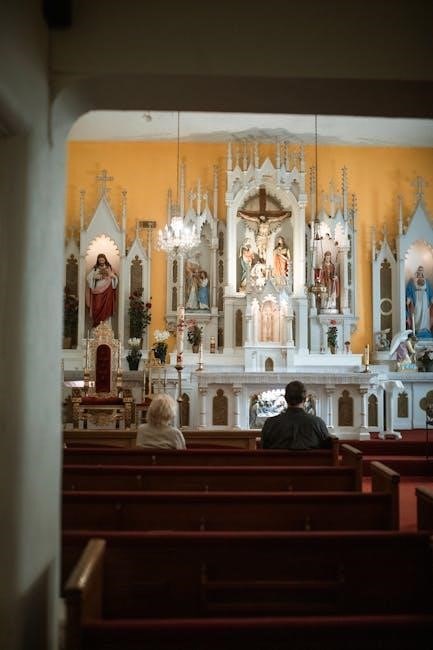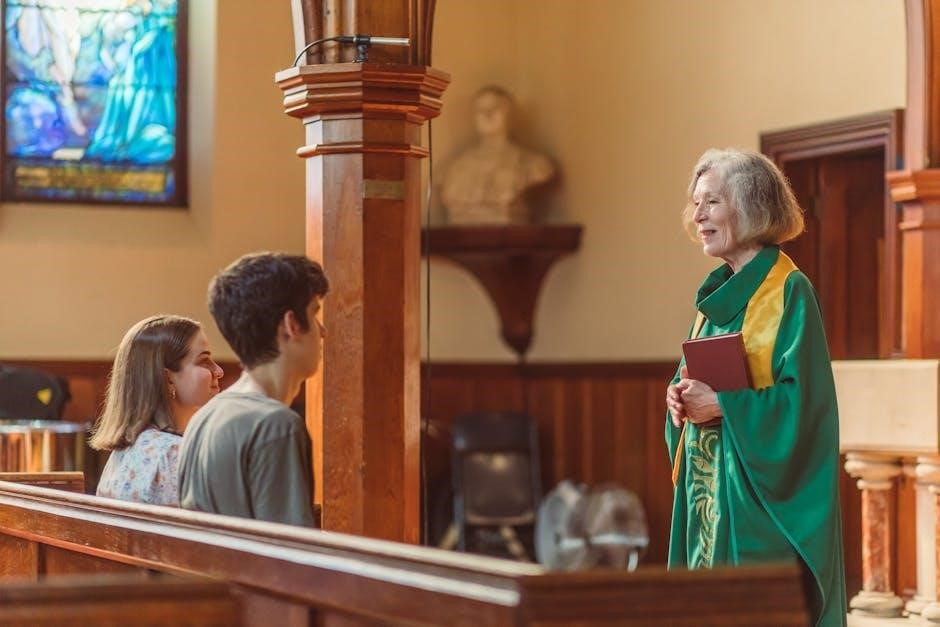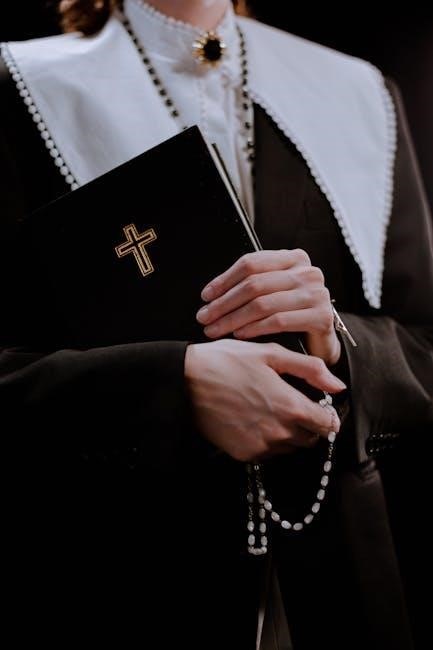
Overview of the 7 Sacraments
The seven sacraments are central to Catholic faith‚ instituted by Christ to impart grace and strengthen spiritual life. Each sacrament serves as an outward sign of inward grace‚ connecting believers to God and the Church community.
- Baptism
- Confirmation
- Eucharist
- Penance
- Anointing of the Sick
- Matrimony
- Holy Orders
The sacraments are sacred rituals instituted by Christ and entrusted to the Catholic Church to impart divine grace and strengthen the spiritual life of believers. They are visible signs of God’s invisible grace‚ connecting faith and everyday life through tangible actions and symbols.
Rooted in Scripture and tradition‚ the sacraments are celebrated in a communal context‚ emphasizing the Church’s role as the Body of Christ. They are not merely individual experiences but expressions of faith shared within the community of believers. Through the sacraments‚ Catholics encounter God’s love‚ forgiveness‚ and guidance at key moments in their lives.
The seven sacraments—Baptism‚ Confirmation‚ Eucharist‚ Penance‚ Anointing of the Sick‚ Matrimony‚ and Holy Orders—are divided into those that initiate believers into the Church‚ those that nourish spiritual growth‚ and those that provide healing or vocational guidance. Together‚ they form a lifelong journey of faith‚ uniting the faithful to Christ and fostering holiness in all aspects of life.
Importance of the Sacraments in Catholic Life
The sacraments are essential to Catholic life‚ serving as the primary means through which God’s grace is received and lived out. They are not just rituals but encounters with Christ that transform and sanctify believers. By participating in the sacraments‚ Catholics experience divine grace‚ which strengthens their faith‚ fosters personal holiness‚ and deepens their relationship with God.

The sacraments also unite Catholics into a single body‚ the Church‚ creating a shared spiritual identity and communal bond. They mark critical moments in life‚ such as birth‚ growth‚ vocation‚ and death‚ providing guidance‚ comfort‚ and celebration. Regular participation in the sacraments‚ especially the Eucharist and Reconciliation‚ is seen as vital for maintaining and nurturing spiritual health.

In essence‚ the sacraments are the lifeblood of Catholicism‚ offering believers the means to live out their faith meaningfully and to attain eternal salvation. They are not optional practices but integral to living a fully Christian life‚ as taught by the Church.

The Seven Sacraments in Detail
The seven sacraments are divine institutions that mark important life moments‚ bringing believers closer to God and His grace. Each sacrament has a unique purpose‚ serving as a means to receive divine grace and strengthen the spiritual life of Catholics.
Baptism
Baptism is the first and foundational sacrament in the Catholic Church‚ marking the initiation of a person into the Christian faith. It involves the use of water‚ symbolizing purification and rebirth‚ and is administered in the name of the Holy Trinity (Father‚ Son‚ and Holy Spirit). Baptism is considered essential for spiritual cleansing and the remission of original sin. It is typically administered to infants but can also be received by adults. The sacrament is celebrated with rituals such as the blessing of water‚ the renunciation of sin‚ and the anointing with holy oils. Baptism not only welcomes individuals into the Church but also bestows upon them the gift of divine grace‚ enabling them to live as children of God. It is a permanent sacrament‚ leaving an indelible mark on the soul‚ and is a prerequisite for receiving the other sacraments. Through Baptism‚ believers are united with Christ and become part of His body‚ the Church‚ embarking on a lifelong journey of faith and discipleship.

Confirmation
Confirmation is a sacrament that strengthens and deepens the faith of baptized individuals‚ typically celebrated during adolescence. It is often referred to as the “sacrament of maturity” in the Christian life. During the ritual‚ the bishop anoints the person with holy oil‚ known as chrism‚ and lays hands on them‚ invoking the Holy Spirit. This sacrament is rooted in biblical tradition‚ where the apostles laid hands on the faithful to impart the Spirit’s gifts. Confirmation binds the person more firmly to the Church and equips them with the grace and courage to publicly witness their faith. It is considered the perfection of Baptism‚ as it completes the initiation into the Catholic Church. The sacrament imparts the seven gifts of the Holy Spirit: wisdom‚ knowledge‚ understanding‚ counsel‚ fortitude‚ piety‚ and fear of the Lord. Through Confirmation‚ individuals are empowered to live as committed disciples of Christ and to actively participate in the mission of the Church.
Eucharist
The Eucharist is one of the most sacred sacraments in the Catholic Church‚ often referred to as the “source and summit” of Christian life. It is a sacrament of thanksgiving and worship‚ where bread and wine are consecrated to become the Body and Blood of Christ. Instituted by Jesus at the Last Supper‚ the Eucharist is a reenactment of His sacrifice on the cross‚ making it a central part of the Mass. Through this sacrament‚ Catholics believe they receive spiritual nourishment and are united with Christ and one another. The Eucharist is also seen as a sacrament of love‚ fostering unity and strength among believers. It is a reminder of God’s infinite love and mercy‚ and it deepens the believer’s commitment to living a life of faith and service. The Eucharist is celebrated daily in Catholic churches worldwide‚ making it a cornerstone of Catholic devotion and spiritual growth.

Penance (Reconciliation)
Penance‚ also known as Reconciliation‚ is a sacrament of healing and forgiveness. It provides an opportunity for Catholics to confess their sins‚ express sorrow‚ and receive absolution from God through the priesthood. This sacrament strengthens the believer’s relationship with God and the Church‚ fostering spiritual renewal and reconciliation. The process typically involves three steps: contrition (sincere repentance)‚ confession (verbally stating sins to a priest)‚ and penance (performing acts of prayer or service as a sign of remorse). Regular confession is encouraged‚ especially for serious sins‚ to maintain a clean conscience and grow in holiness. Penance is a powerful means of seeking God’s mercy and living a life aligned with His will. It reminds believers of the importance of forgiveness and the need to strive for moral integrity. Through this sacrament‚ Catholics experience God’s loving forgiveness and are called to forgive others in return‚ fostering a community of love and reconciliation.
Anointing of the Sick
The Anointing of the Sick is a sacrament of healing and comfort‚ traditionally administered to those who are seriously ill‚ injured‚ or nearing death. It is a spiritual remedy that imparts grace to the afflicted‚ offering strength‚ peace‚ and forgiveness of sins. The sacrament involves the anointing of the person’s forehead and hands with blessed oil by a priest‚ accompanied by prayer. While it is often associated with the dying‚ it is also intended for anyone facing a serious health crisis‚ including mental or emotional distress. The Anointing of the Sick does not guarantee physical healing but provides spiritual consolation and prepares the soul for eternal life. It reminds the faithful of God’s loving presence and care‚ especially in times of suffering. This sacrament is a powerful expression of faith‚ hope‚ and trust in divine mercy‚ reinforcing the belief that bodily and spiritual healing are gifts from God.
Matrimony
Matrimony‚ or the Sacrament of Marriage‚ is a covenant by which a man and a woman establish a lifelong partnership‚ sealed by God’s grace. It is one of the seven sacraments and is rooted in God’s plan for humanity‚ reflecting the love and unity between Christ and his Church. The sacrament is administered by the couple themselves‚ with a priest serving as a witness. Matrimony is a sacred bond that requires mutual consent‚ commitment‚ and openness to life. It is a source of grace‚ enabling the couple to fulfill their vows‚ support one another‚ and build a Christian family. The sacrament emphasizes the dignity of marriage as an institution and fosters a deep‚ self-giving love between spouses. Through Matrimony‚ couples are called to mirror God’s love and to grow in holiness together. The Church celebrates this sacrament as a joyful expression of faith‚ unity‚ and devotion.
Holy Orders
Holy Orders is the sacrament through which men are ordained as bishops‚ priests‚ or deacons‚ dedicating their lives to serving the Church and its people. It is a sacrament of vocation‚ calling individuals to a life of spiritual leadership and service. The sacrament is administered by a bishop‚ who lays hands on the candidate‚ praying for the outpouring of the Holy Spirit. This act confers the grace and authority to perform sacred duties‚ such as administering the sacraments‚ preaching the Word of God‚ and guiding the faithful. Holy Orders is rooted in the apostolic tradition‚ with bishops succeeding the apostles as shepherds of the Church. Priests and deacons assist bishops in their mission‚ with distinct roles and responsibilities. The sacrament emphasizes the importance of obedience‚ celibacy (for bishops and priests in the Latin Church)‚ and a life of prayer and devotion. Through Holy Orders‚ the Church is built up‚ and the mission of Christ is continued in the world.